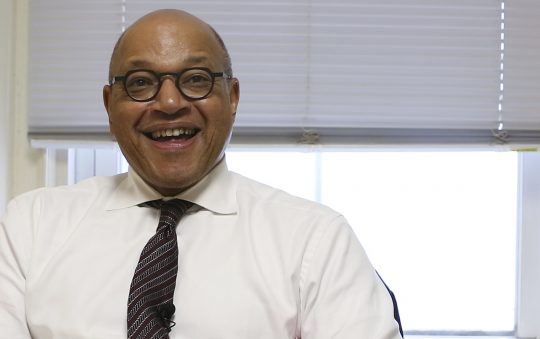Filmmaker Khadijah Fanaka changes the narrative around her grandfather’s legacy

In a day and age in which up-and-coming filmmakers aspire to be the next Spike Lee, John Singleton, or Ryan Coogler, many are unaware that their forefather was Jamaa Fanaka. Once heralded as “The most famous unknown filmmaker in America” by Turner Movie Classics, Fanaka was a preeminent auteur (writer, director, producer) in the 1970s and ‘80s.
As a graduate student at UCLA, Fanaka’s feature film, “Penitentiary” was a critically acclaimed box office success grossing upwards of $30 million, which was the highest-grossing independent film of 1979. Amid this prolific feat, Fanaka’s career was also marred with controversy when he fought against racial injustices within the entertainment industry.
His unwillingness to be silenced in the face of adversities resulted in the filmmaker being ousted from Hollywood and shunned by many of his peers who would later benefit from his groundwork.
Related Stories
USC Football Aim to Dominate the 2022 Season
LA84 Play Equity Summit Shares Ways to Care For Athletes
Now, ten years since his passing in 2012, his granddaughter Khadijah Fanaka has taken up the mantle with her forthcoming documentary, “A Leader Without Authority: The Jamaa Fanaka Story.”
The L.A. native and Howard University alumna speaks with the L.A. Sentinel about her quest to ensure that her grandfather’s legacy is accurately depicted and celebrated for generations to come.

LAS: Why was Jamaa Fanaka so controversial and what changes in entertainment do you see as a result of his work?
KF: While at UCLA, he was known for his role as a major figure in the L.A. Rebellion film movement. The L.A. Rebellion was a group of Black UCLA film school graduates who came of age in the late 1970s in the so-called Blaxploitation era. Their defining aesthetic was moving beyond the pimp stereotypes and funk soundtracks in film portrayals of Black people.
He went on to become one of the few Black members of the Directors Guild of America (DGA). He was a part of the group that spearheaded the resurgence of the African American Steering Committee within the organization. But, it wasn’t long before he found the organization to be riddled with discriminatory practices. When his attempts to change the dynamics quietly were ignored, he decided to take action.
Before the current push for diversity, inclusion, and accountability, Fanaka jeopardized his own career in the name of collectivism. He brought a series of class-action lawsuits against the DGA, claiming that its word-of-mouth system of alerting directors about job opportunities was inherently discriminatory and a violation of the Civil Rights Act of 1964. He claimed the DGA was part of a conspiracy to keep women and minorities out of the industry. He was “Oscars So White” and “Time’s Up” before hashtags.

While doing research for the documentary, the 2pac quote – “I’m not saying I’m gonna change the world, but I guarantee that I will spark the brain that will change the world” – came to mind. People have told me that my grandfather guided them through their own fight against the same entities he was up against 30 years ago.
They referenced his lawsuits and appeals. All these years later and people are asking for the same thing, a fair chance, and sadly they are pleading to the same people. They are being called crazy just like my grandfather was. This is why his story is relevant today.
LAS: Many of the “adversaries” your grandfather came in contact with still work in the industry today. Based on what some may consider an “infamous” legacy, did you have any reservations about telling his story?
KF: In 2020, at the height of the pandemic, my mother urged me to think long and hard about telling his story and taking on his name, Fanaka. She cautioned me because of the “adversaries.” She saw how tough this industry could be on truth-tellers and wanted me to know I may be putting a target on my back.
But I decided, if not me, then who? If the last film I make is this documentary because I become blacklisted like my grandfather and the others who fought back, I’d make peace with that.
It’s a daunting task, but I’m up for it because he deserves at least that after the powers that be, essentially destroyed, impoverished, and killed Jamaa Fanaka’s career and creativity, subsequently building an empire on his bones.

LAS: What challenges have you experienced in making the doc and how have you overcome them?
KF: The intersectionality of being a filmmaker and being in the headspace of a director/producer while simultaneously being the granddaughter of the subject of the project has been the biggest challenge that I didn’t foresee. Knowing the importance of this legacy and wanting to tell it and hearing his story “doesn’t have legs” or talking to my grandfather’s friends and hearing the passion and pain in their voices when remembering him has put me into a rut a couple of times.
The duty I feel to my grandfather, my family, and myself to see this through brings me back every time though.
A fellow creative that I admire greatly told me that every bit of the filmmaker my grandfather was is in me. She said that to me when I was running from the project out of fear and I think about that encouragement session every time I get discouraged or have imposter syndrome.
LAS: What advice would you share with other aspiring filmmakers, especially those that want to get into documentary filmmaking?
KF: Cultivate a team of people that keep you humble and also remind you of your worth and power when you forget. Don’t be afraid to move on. Build relationships, because who you know is nine times out of 10 more important than what you know. Trust, hire and listen to Black women.
To learn more about “A Leader Without Authority: The Jamaa Fanaka Story,” visit khadijahfanaka.com







